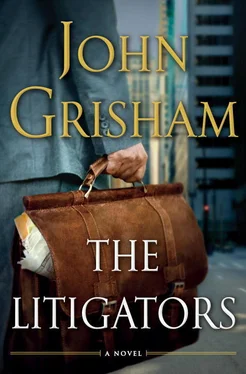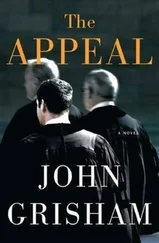Abner slid a cup of coffee in front of him and said, “Just brewed it.”
David ignored it. He said, “So you work on retainer, huh? Just like a law firm. What could I get for a thousand bucks a month?”
“At the rate you’re going, a thousand won’t touch it. Have you called your wife, David?”
“Look, Abner, you’re a bartender, not a marriage counselor. This is a big day for me, a day that will change my life forever. I’m in the middle of a major crack-up, or meltdown, or whatever it is. My life will never be the same, so let me enjoy this moment.”
“I’ll call you a cab whenever you want.”
“I’m not going anywhere.”
For initial client conferences, Oscar always put on his dark jacket and straightened his tie. It was important to set the tone, and a lawyer in a black suit meant power, knowledge, and authority. Oscar firmly believed the image also conveyed the message that he did not work cheap, though he usually did.
He pored over the proposed property settlement, frowning as if it had been drafted by a couple of idiots. The Flanders were on the other side of his desk. They occasionally glanced around to take in the Ego Wall, a potpourri of framed photos showing Mr. Finley grinning and shaking hands with unknown celebrities, and framed certificates purporting to show that Mr. Finley was highly trained and skilled, and a few plaques that were clear proof he had been justly recognized over the years. The other walls were lined with shelves packed with thick, somber law books and treatises, more proof still that Mr. Finley knew his stuff.
“What’s the value of the house?” he asked without taking his eyes off the agreement.
“Around two-fifty,” Mr. Flander replied.
“I think it’s more,” Mrs. Flander added.
“This is not a good time to be selling a house,” Oscar said wisely, though every homeowner in America knew the market was weak. More silence as the wise man studied their work.
He lowered the papers and peered over his drugstore reading glasses into the expectant eyes of Mrs. Flander. “You’re getting the washer and dryer, along with the microwave, treadmill, and flat-screen television?”
“Well, yes.”
“In fact, you’re getting probably 80 percent of the household furnishings, right?”
“I suppose. What’s wrong with that?”
“Nothing, except he’s getting most of the cash.”
“I think it’s fair,” said Mr. Flander.
“I’m sure you do.”
“Do you think it’s fair?” she asked.
Oscar shrugged as if it weren’t his business. “Pretty typical, I’d say. But cash is more important than a trainload of used furniture. You’ll probably move into an apartment, something much smaller, and you won’t have enough room for all your old stuff. He, on the other hand, has money in the bank.”
She shot a hard look at her soon-to-be-ex-husband. Oscar hammered away. “And your car is three years older, so you’re getting the old car and the old furniture.”
“It was his idea,” she said.
“It was not. We agreed.”
“You wanted the IRA account and the newer car.”
“That’s because it’s always been my car.”
“And that’s because you’ve always had the nicer car.”
“That’s not true, Barbara. Don’t start exaggerating like you always do, okay?”
Louder, Barbara responded, “And don’t you start lying in front of the lawyer, Cal. We agreed we would come here, tell the truth, and not fight in front of the lawyer. Didn’t we?”
“Oh, sure, but how can you sit there and say I’ve always had the nicer car? Have you forgotten the Toyota Camry?”
“Good God, Cal, that was twenty years ago.”
“Still counts.”
“Well, yes, I remember it, and I remember the day you wrecked it.”
Rochelle heard the voices and smiled to herself. She turned a page of her paperback. AC, asleep beside her, suddenly rose to his feet and began a low growl. Rochelle looked at him, then slowly got up and walked to a window. She adjusted the blinds to give herself a view, then she heard it — the distant wail of a siren. As it grew louder, AC’s growl also picked up the volume.
Oscar was also at a window, casually looking at the intersection in the distance, hoping for a glimpse of the ambulance. It was a habit too hard to break, not that he really wanted to stop. He, along with Wally and now Rochelle and perhaps thousands of lawyers in the city, couldn’t suppress a rush of adrenaline at the sound of an approaching ambulance. And the sight of one flying down the street always made him smile.
The Flanders, though, were not smiling. They had gone silent, both glaring at him, each hating the other. When the siren faded away, Oscar returned to his chair and said, “Look, folks, if you’re going to fight, I can’t represent both of you.”
Both were tempted to bolt. Once on the street, they could go their separate ways and find more reputable lawyers, but for a second or two they were not sure what to do. Then Mr. Flander blinked. He jumped to his feet and headed for the door. “Don’t worry about it, Finley. I’ll go find me a real lawyer.” He opened the door, slammed it behind him, then stomped past Rochelle and the dog as they were settling into their places. He yanked open the front door, slammed it too, and happily left Finley & Figg forever.
Happy hour ran from five to seven, and Abner decided his new best friend should leave before it started. He called a cab, soaked a clean towel with cold water, then walked to the other side of the bar and gently punched him. “David, wake up, pal, it’s almost five o’clock.” David had been out for an hour. Abner, like all good bartenders, did not want his after-work crowd to see a drunk facedown on the bar, comatose, snoring. Abner touched his face with the towel and said, “Come on, big guy. Party’s over.”
David suddenly came around. His eyes and mouth flew open as he gawked at Abner. “What, what, what?” he stammered.
“It’s almost five. Time to go home, David. There’s a cab outside.”
“Five o’clock!” David shouted, stunned at the news. There were half a dozen other drinkers in the bar, all watching with sympathy. Tomorrow it could be them. David got to his feet and with Abner’s help managed to pull on his overcoat and find his briefcase. “How long have I been here?” he asked, looking around wildly as if he’d just discovered the place.
“A long time,” Abner replied. He stuffed a business card into a coat pocket and said, “Call me tomorrow and we’ll settle the tab.” Arm in arm they staggered to the front door and through it. The cab was at the curb. Abner opened the rear door, wrestled David into the seat, said “He’s all yours” to the driver, and closed the door.
David watched him disappear into the bar. He looked at the driver and said, “What’s your name?”
The driver said something unintelligible, and David barked, “Can you speak English?”
“Where to, sir?” the driver asked.
“Now, that’s a really good question. You know any good bars around here?”
The driver shook his head.
“I’m not ready to go home, because she’s there and, well, oh, boy.” The inside of the cab had started to spin. There was a loud honk from behind. The driver eased into traffic. “Not so fast,” David said with his eyes closed. They were going ten miles an hour. “Go north,” David said.
“I need a destination, sir,” the driver said as he turned onto South Dearborn. Rush-hour traffic was already heavy and slow.
“I might be sick,” David said, swallowing hard and afraid to open his eyes.
“Please, not in my car.”
They stopped and started for two blocks. David managed to calm himself. “A destination, sir?” the driver repeated.
Читать дальше












